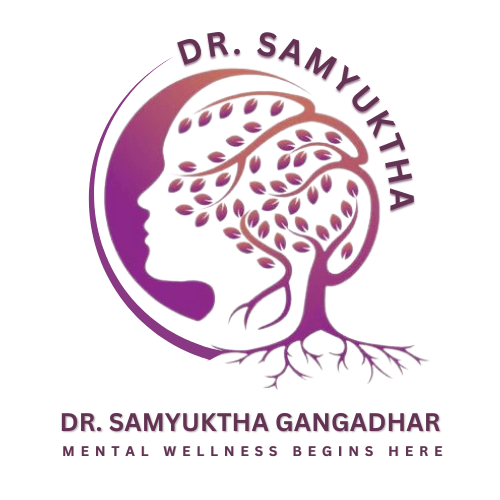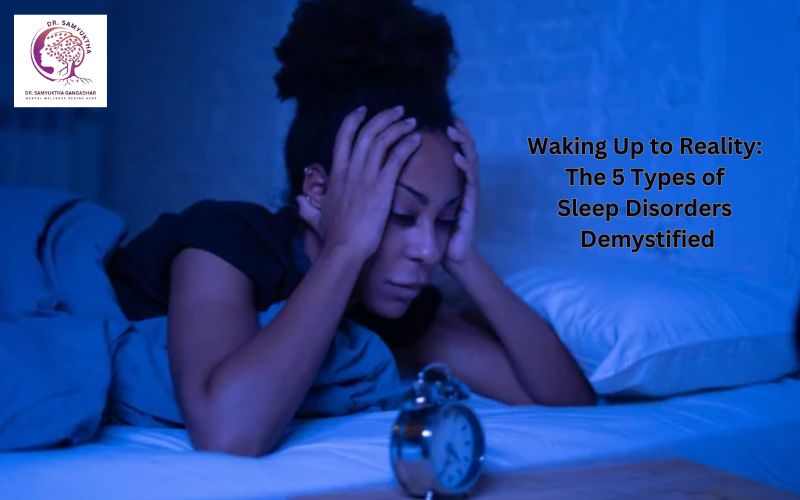Introduction
Sleep is a fundamental aspect of our well-being, yet millions struggle with sleep disorders that disrupt their lives. Understanding these disorders is crucial for effective treatment and recovery. In this blog, we will demystify the five most common types of sleep disorders, providing insights into their causes, symptoms, and treatment options available, particularly focusing on sleep disorder treatment in Kolkata through expert guidance at Pushpa Mind Care, led by Dr. Samyuktha Gangadhar, M.D. (Psychiatry). Here are five subheadings for each type of sleep disorder:
1. Insomnia
What is Insomnia?
Insomnia is characterized by difficulty falling asleep, staying asleep, or waking up too early and not being able to go back to sleep. It can be acute (short-term) or chronic (long-term), affecting daily functioning and overall health.
Causes of Insomnia
Several factors can contribute to insomnia, including:
- Stress and Anxiety: Worries about work, school, health, or family can lead to sleeplessness.
- Medical Conditions: Chronic pain, asthma, or gastrointestinal issues may disrupt sleep.
- Medications: Some medications can interfere with sleep patterns.
- Lifestyle Choices: Caffeine, nicotine, and irregular sleep schedules can exacerbate insomnia.
Symptoms of Insomnia
Common symptoms include:
- Difficulty falling or staying asleep
- Daytime fatigue or sleepiness
- Irritability and mood swings
- Difficulty concentrating
Treatment Options
At Pushpa Mind Care, Dr. Samyuktha Gangadhar offers personalized treatment for insomnia, including:
- Cognitive Behavioral Therapy for Insomnia (CBT-I): A structured program that helps change thoughts and behaviors around sleep.
- Medications: When necessary, sleep aids may be prescribed.
- Sleep Hygiene Education: Guidance on improving sleep environments and routines.
2. Sleep Apnea

What is Sleep Apnea?
Sleep apnea is a serious condition characterized by repeated interruptions in breathing during sleep. The most prevalent form is obstructive sleep apnea (OSA), which happens when the muscles in the throat relax too much.
Causes of Sleep Apnea
Factors that contribute to sleep apnea include:
- Obesity: Excess weight can put additional pressure on the airway.
- Anatomical Factors: Structural issues in the throat or nasal passages.
- Age and Gender: Men are more likely to develop sleep apnea, especially as they age.
Symptoms of Sleep Apnea
Symptoms may include:
- Loud snoring
- Gasping or choking during sleep
- Morning headaches
- Excessive daytime sleepiness
Treatment Options
Effective treatment options for sleep apnea include:
- Continuous Positive Airway Pressure (CPAP): A machine that delivers air pressure to keep airways open.
- Lifestyle Changes: Weight reduction, minimizing alcohol use, and changing sleeping postures.
- Surgery: In certain situations, surgical procedures might be required.
At Pushpa Mind Care, our team can evaluate and recommend appropriate treatments tailored to individual needs.
3. Restless Legs Syndrome (RLS)
What is Restless Legs Syndrome?
Restless Legs Syndrome (RLS) is a neurological condition that causes an irresistible urge to move the legs, often accompanied by uncomfortable sensations.
Causes of RLS
RLS can be primary (idiopathic) or secondary, related to:
- Genetics: A family history of RLS may increase risk.
- Iron Deficiency: Low iron levels can contribute to symptoms.
- Chronic Conditions: Conditions such as diabetes or kidney failure may trigger RLS.
Symptoms of RLS
Common symptoms include:
- A bothersome feeling in the legs, commonly described as tingling or crawling sensations.
- Relief from movement, which can disrupt sleep.
- Symptoms tend to intensify in the evening or when the individual is inactive.
Treatment Options
Management of RLS includes:
- Lifestyle Changes: Regular exercise, reducing caffeine intake, and establishing a regular sleep routine.
- Medications: Dopamine agonists or anti-seizure medications may be prescribed.
Consulting with Dr. Samyuktha Gangadhar can provide insights into effective treatment plans specific to RLS.
4. Narcolepsy
What is Narcolepsy?
Narcolepsy is a long-term neurological condition marked by excessive daytime drowsiness and sudden episodes of falling asleep. People with narcolepsy may fall asleep uncontrollably during the day.
Causes of Narcolepsy
While the exact cause is unknown, factors may include:
- Genetics: A family history of narcolepsy.
- Brain Injuries: Damage to the brain areas that control sleep.
Symptoms of Narcolepsy
Key symptoms include:
- Excessive daytime sleepiness
- Cataplexy: Sudden loss of muscle control triggered by intense emotions.
- Sleep paralysis: An inability to move or speak temporarily while either falling asleep or waking up.
Treatment Options
Treatment typically involves:
- Medications: Stimulants to promote wakefulness and antidepressants for cataplexy.
- Lifestyle Modifications: Scheduled naps and good sleep hygiene.
Pushpa Mind Care offers comprehensive evaluations for narcolepsy and can create tailored management plans.
5. Circadian Rhythm Disorders

What are Circadian Rhythm Disorders?
Circadian rhythm disorders are disruptions in the natural sleep-wake cycle, affecting when individuals feel alert or sleepy. Common types include delayed sleep phase disorder and shift work disorder.
Causes of Circadian Rhythm Disorders
Factors contributing to these disorders may include:
- Irregular Sleep Schedules: Frequent changes in sleep patterns.
- Environmental Factors: Exposure to light at night, such as from screens.
Symptoms of Circadian Rhythm Disorders
Symptoms may include:
- Difficulty falling asleep or waking up at desired times.
- Insomnia or excessive sleepiness.
- Poor concentration and performance.
Treatment Options
Treatment strategies include:
- Light Therapy: Exposure to bright light at specific times to reset the sleep-wake cycle.
- Melatonin Supplements: To help regulate sleep patterns.
- Behavioral Interventions: Developing a consistent sleep routine.
At Pushpa Mind Care, we offer specialized guidance on managing circadian rhythm disorders effectively.
Conclusion
Understanding sleep disorders is vital for improving overall health and quality of life. If you or a loved one is struggling with any of these conditions, it’s important to seek professional help. At Pushpa Mind Care, Dr. Samyuktha Gangadhar provides expert care and personalized options for sleep disorder treatment in Kolkata.
Remember, quality sleep is essential for mental and physical well-being, and taking steps towards treatment can lead to a healthier, more fulfilling life.
For more information on sleep disorder treatment in Kolkata, feel free to reach out to us.
FAQs
The best treatment for sleep disorders varies by condition. At Pushpa Mind Care, we offer personalized plans that may include Cognitive Behavioral Therapy for Insomnia (CBT-I), lifestyle changes, and medication. Dr. Samyuktha Gangadhar, M.D. (Psychiatry), collaborates with patients to restore healthy sleep patterns effectively.
Managing a sleep disorder involves:
- Establishing a Sleep Routine: Consistent sleep and wake times help regulate your body clock.
- Creating a Comfortable Environment: Keep your bedroom dark, quiet, and cool.
- Limiting Stimulants: Avoid caffeine and heavy meals before bed.
- Practicing Relaxation Techniques: Incorporate meditation or deep breathing.
- Seeking Professional Help: Consult with Dr. Samyuktha Gangadhar for tailored advice.
Sleep disorders are not classified as mental illnesses but can be linked to conditions like anxiety and depression. At Pushpa Mind Care, we address both sleep issues and underlying mental health factors for comprehensive care.
Sleep apnea, particularly obstructive sleep apnea (OSA), is considered one of the most serious sleep disorders due to its potential health risks. It can lead to complications like heart disease and daytime fatigue. If you suspect sleep apnea, seek help from Dr. Samyuktha Gangadhar at Pushpa Mind Care for proper diagnosis and treatment.

